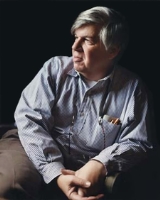
, evolutionary biologist
, and historian of science
. He was also one of the most influential and widely read writers of popular science
of his generation.
Gould spent most of his career teaching at Harvard University
and working at the American Museum of Natural History
in New York. In the latter years of his life, Gould also taught biology and evolution at New York University
near his home in SoHo
.
Gould's greatest contribution to science was the theory of punctuated equilibrium
, which he developed with Niles Eldredge
in 1972.
God bless all the precious little examples and all their cascading implications; without these gems, these tiny acorns bearing the blueprints of oak trees, essayists would be out of business.![]()
I want to argue that the “sudden” appearance of species in the fossil record and our failure to note subsequent evolutionary change within them is the proper prediction of evolutionary theory as we understand it. […] Evolutionary “sequences” are not rungs on a ladder, but our retrospective reconstruction of a circuitous path running like a labyrinth, branch to branch, from the base of the bush to a lineage now surviving at its top.![]()
If there is any consistent enemy of science, it is not religion, but irrationalism.![]()
Each of the major sciences has contributed an essential ingredient in our long retreat from an initial belief in our own cosmic importance. Astronomy defined our home as a small planet tucked away in one corner of an average galaxy among millions; biology took away our status as paragons created in the image of God; geology gave us the immensity of time and taught us how little of it our own species has occupied.![]()
[A]s a graduate student at Columbia University, I remember the a priori derision of my distinguished stratigraphy professor toward a visiting Australian drifter [a supporter of the theory of continental drift]. […] Today […] my own students would dismiss with even more derision anyone who denied the evident truth of continental drift—a prophetic madman is at least amusing; a superannuated fuddy-duddy is merely pitiful.![]()
I contend that the continued racial classification of Homo sapiens represents an outmoded approach to the general problem of differentiation within a species. In other words, I reject a racial classification of humans for the same reasons that I prefer not to divide into subspecies the prodigiously variable West Indian land snails that form the subject of my own research.![]()

